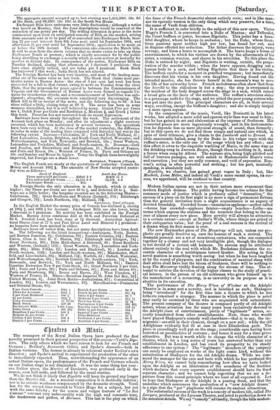C4tatrto nut Muir.
The managers of the Royal Italian Opera have produced the first novelty promised in their general prospectus of this season—Verdi's.Rigo- letto. The only others which we have reason to look for are French and German ; Berlioz's Benrenuto Wind, and Spohr's Jessonda—both in Italian versions. The former is already in rehearsal under Berlioz's own direction ; and Spohr's arrival fo superintend the production of the other is immediately expected. Thus, notwithstanding the appearance of an actual Italian opera, the predominance of the French and German schools on our Italian stage is not diminished. It was the same thing last year : one Italian piece, the Martini of Donizetti, was produced early in the season, soon laid aside, and followed by the usual routine. We do not think it likely that .Rigoletto will keep its ground any longer than the Martini did. As a musical composition it is decidedly inferior; nor is its artistic weakness compensated by the dramatic strength. Verdi has for the second time resorted to Victor Hugo for a subject, but not with the same felicity ; for the coarse and vulgar horrors of "Le Roi s'amuse" contrast very unfavourably with the high and romantic tone, the tenderness and pathos, of Hernani. This last is the play on which
the fame of the French dramatist almost entirely rests; and in like man- ner its operatic version is the only thing which may preserve, for a time,. the name of Verdi from oblivion.
It is sufficient to refer briefly to the subject of this new opera. Victor Hugo's Francis I. is converted into a Duke of Mantua; and Triboulek the Court buffoon or jester, becomes Rigoletto. This jester has a beau- tiful daughter, whom he keeps in seclusion ; but the Duke' whose licen- tious passions spare neither high nor low, has found her out, and in disguise effected her seduction. The father discovers the injury, vows revenge, and hires a bravo to accomplish it. The bravo keeps a house of entertainment, to which his victims are drawn by the allurements of his sister, a common -wanton and sharer in his atrocities. To this place the Duke is enticed by night; and Rigoletto is waiting, outside the perpe- tration of the murder within • when the bravo appears, dragging out ir human body in a sack, and 'telling Rigoletto that there is his victim. The buffoon exults for a moment in gratified vengeance ; but immediately- discovers that his victim is his own daughter. Having found out the, intended murder, she has thrown herself in the assassin's way to save the life of her unworthy lover. French melodramas often show that from the horrible to the ridiculous is but a step ; the step is overpassed in the incident of the body dragged across the stage in a sack, which raised' a broad grin on the faces of the audience. The ruffian's atrocious sister is a personage unfit for the stage, and we pitied the poor young actress who was put into the part. The principal characters are all, in their several ways, revolting, except the buffoon's daughter; and she is simply insipid —a mere opera soprano. In the composition of the music, Verdi, like Donizetti in his latest works, has adopted a more solid and operose style than was usual to him ; but he has gained in art and elaboration at the expense of freshness. His concerted pieces are more ingeniously wrought, and in his instrumenta- tion he depends less on mere physical strength of sound, than formerly ; but in this opera we do not find those simple and natural airs which, in spite of their triteness, give a charm to the Lombardi and to Ernatai. A. little anacreontic ballad, sung by the Duke in his vulgar orgie with the ruffian's sister, is the only one of the songs which has any effect ; and this effect it owes to the exquisite warbling of Mario, in the same way. as the drinking-song in Lucrezia Borgia, though there is nothing in it, made a furore when sung by Alboni. The soprano airs, being high-pitched and full of bravura passages, are well suited to Mademoiselle Bosio's voice and execution ; but they are sadly common, and void of expression. Ron- coni's acting is often powerful and striking ; but his part, musically speaking, is absolutely null. Bigoletto, we observe, has gained great vogue in Italy ; but, like Macbeth, Luisa Miller, and indeed all Verdi's more recent operas, its suc- cess, we apprehend, will be confined to that country.


























 Previous page
Previous page